Suzuki V-Strom 650
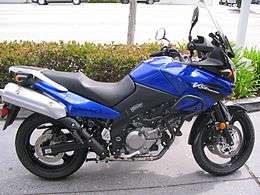 | |
| Manufacturer | Suzuki |
|---|---|
| Also called | DL650 |
| Production | since 2004 |
| Class | Middleweight Sport Touring[1] |
| Engine | 645 cc, 4-stroke, liquid cooled, 90-degree V-twin, DOHC, 8-valves, wet sump |
| Bore / stroke | 81.0 mm × 62.6 mm (3.19 in × 2.46 in) |
| Power | 66bhp[2] |
| Torque | 44.3lb ft of torque at 6,400rpm[2] |
| Transmission | 6-speed, constant mesh, final drive chain |
| Wheelbase | 1,555 mm (61.2 in) |
| Dimensions |
L: 2,290 mm (90 in) W: 840 mm (33 in) H: 1,390 mm (55 in) (screen in low position) |
| Weight | 220 kg (490 lb) (wet) |
| Fuel capacity | 22 L (4.8 imp gal; 5.8 US gal) |
| Fuel consumption | 54 mpg-US (4.4 L/100 km; 65 mpg-imp) |
| Related | V-Strom 1000 |
The V-Strom 650, internally designated DL650, is a mid-weight, sport touring motorcycle launched in 2004[1] with a standard riding posture, fuel injection and an aluminum chassis — now in its second generation since model year 2012. Marketed in Europe, Oceania and the Americas, the DL650 is manufactured at Suzuki's ISO 14001 certified final assembly plant in Toyokawa, Japan.
The V-Strom 650 trades strength in a single area for adaptability to a variety of riding conditions: commuting, cruising, adventure touring, and to a lesser degree, off-road riding.[3][4][5][6] The bike is variously categorized as dual sport, sport enduro tourer,[7] street/adventure, commuter, or entry-level.[8]
According to the New York Times, the V-Strom has a loyal following worldwide, and the DL650 outsells Suzuki's larger DL1000 two-to-one.[9]
The name V-Strom combines V, referring to the bike's V engine configuration, with the German word Strom, meaning stream or current.[10]
Mechanicals
The V-Strom has a six-speed transmission with a fuel-injected and slightly retuned 645 cc engine from Suzuki's SV650 sport bike, using a two-into-one exhaust system.[11] An upright, standard riding posture contributes to the bike's handling characteristics.
- Engine
The engine is a 90-degree, liquid cooled, four-stroke V-twin, with 81.0 mm (3.19 in) bore and a 62.6 mm (2.46 in) stroke, four valves per cylinder, and intake and exhaust valving each with their own camshaft. Its more relaxed cam profiles, compared with the SV engine, boost the power between 4,000 and 6,500 rpm, along with slight changes to the airbox and exhaust. Relative to the SV, the crank inertia (flywheel effect) is also increased by 4% via a redesigned starter clutch.[12] As well, the DL650 engine uses a plastic outer clutch cover and engine sprocket cover for reduced weight and noise.[12]
Unlike the SV engine, which uses cast iron cylinder sleeves, the DL650 uses Suzuki's proprietary SCEM (Suzuki Composite Electro-chemical Material) plated cylinders, a race-proven nickel-phosphorus-silicon-carbide coating for reduced weight and improved heat transfer, allowing for tighter and more efficient piston-to-cylinder clearance,[12] similar to a Nikasil coating.
- Engine electronics
The DL650 engine electronics aid starting and throttle control and uses Suzuki's AFIS (Auto Fast Idle System), eliminating a fast-idle control. The engine control module (ECM) reads engine information, such as coolant temperature, via a 16-bit central processing unit (CPU), controlling the fuel system's dual throttle bodies.
- Emissions
The DL650 uses Suzuki Dual Throttle Valve (SDTV) fuel-injection and exhausts via a two-into-one exhaust system with a catalytic converter in the muffler. European models meet Euro 3 emissions specifications. In the US, a "PAIR" air injection system reduces CO and HC emissions.
- Chassis
A stiff, twin-spar aluminum frame and swingarm accommodates a rear Showa mono-shock with rebound[13][14] and hydraulic preload adjustment. Front Showa damper-rod forks are preload adjustable. The DL650 has a 19-inch front wheel and a 17-inch rear wheel.
- Instruments and bodywork
The bike's instrument cluster includes a compact analog step-motor speedometer and tachometer (both with LED illumination) and a digital LCD unit with odometer, tripmeter, coolant temperature gauge, fuel gauge, LED neutral, digital clock, turn signal and high beam lights and an oil pressure warning light.
An adjustable windshield allows movement of 50 mm (2 inches) A small underseat compartment, suitable for small tools, gloves, or an owner's manual, can be accessed by removal of the seat, via a lock located at the rear of the bike, just below the built-in rack.
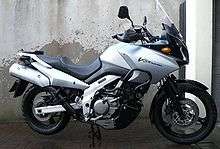
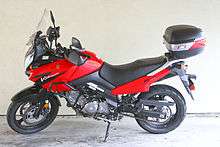
Awards and reviews
The V-Strom 650 was named one of the "ten best" bikes under $10,000 by Motorcyclist (USA) magazine, October, 2007—beating out, among many others, the V-Strom 1000. In a September 2006 article, Cycle World magazine wrote "the DL650 may just be the most shockingly competent machine in the world today."[15] A 2004 article from MotorcycleUSA.com said "it was hard to imagine another machine with a competitive versatility-per-dollar ratio."[7] Twice consecutively, the DL650 has earned the title "Alpenkoenig", winning German Motorrad magazine's trans-alp multi-bike test in 2005 and 2006.[16]
At the DL650's launch, noted motorcycle journalist Kevin Ash said "taking everything into account - price, comfort, fuel range, general ability, you could argue it was the bike of the year,"[17] adding, "there's something honest and solid about the V-Strom."[17] Having ridden a DL650 as his daily rider, in 2005 Ash called it the "best bike you can buy."[2] Ash complimented the bike's comfort, fuel range, engine and handling, faulting its brakes and corrosion resistance[2] — and further describing the bike as "perhaps the ultimate all-round machine." At the launch of the revised 2012 model, Ash noted that the previous generation, which could be very vulnerable to corrosion, had "been left behind, especially by direct rival, the Kawasaki Versys."[18] After the release of the 2012 model, Ash placed the Vstrom ahead of the Versys.[18]
First generation
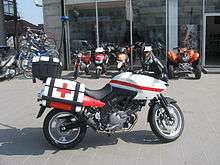
- 2004
- First model year
- 2005
- Headlight interrupt when starting added.
- 2007
- Optional ABS (Anti-lock braking system)
- Wheelbase increased from 60.6 in (1,539 mm) to 61.2 in (1,554 mm) with an increase in the swingarm length by .597 in (15 mm)
- Dual sparkplugs at each cylinder.
- Idle adjustment screw removed
- 2008
- Alternator output increased from 375 to 400 watts.
- 2009
- All-steel locknut on rear axle, previously cotter pin style.
- Clear signal light lenses, previously amber.
- 2010
- No 2010 models in US.
- 2011
- For US, all models, ABS equipped.
Second generation
- 2012
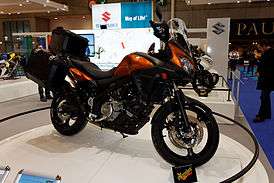 VStrom 2012
VStrom 2012
- Body restyled
- Fuel tank capacity reduced from 22L to 20L (5.8 U.S. gallons to 5.3 U.S. Gallons)
- Seat height raised from 32.3 to 32.9 inches
- Internal transmission changes to reduce noise and boost low to midrange torque
- Power increase from 63.5 horsepower and 41.2 lb-ft of torque to 66.2 horsepower and 43.0 lb-ft of torque
- Rear suspension travel increased .4" to 6.3 inches
- Redesigned instrument panel with trip counters, average mileage, ambient temp, and gear position displays
- Reduction in GVW by 18 lbs
- Anti-theft system integrated into the ECU with the ignition key featuring a security chip (Europe)
- External oil cooler integrated into base of oil filter (heat exchanger)
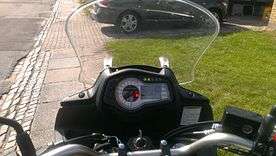
- 2015 XT Model
- Front styling included a beak-like front cowl
- Wheels were changed to lightweight wire-spoked aluminium rims to help to ensure comfort for adventure touring
- Curb weight of 215 kg (474 lb)
References
- 1 2 "Performance Index '10" (PDF), Motorcycle Consumer News, Bowtie Magazines, 2010, retrieved 2011-02-14
- 1 2 3 4 "The best bike you can buy". London: The Telegraph, Kevin Ash, 30 Jul 2005. 30 July 2005.
- ↑ "Road Test: Suzuki DL650 V-Strom". London: The Independent, Tim Luckhurst 21 June 2005.
Suzuki try to encapsulate its potential by summarising it as a "middleweight sport enduro tourer." A better way of putting it is that this is a motorcycle you could ride to work in heavy traffic throughout the year and then take on a long touring holiday around Europe. Having arrived at your campsite in the Pyrenees you could then strip away the luggage and belt out for a few hours' jousting with sports bikes on hairpin bends.
- ↑ "the ugly sister". Motorbikestoday.com,.
It would be ideal as a first bigger bike for a large person, as a commuter or even as a tourer
- ↑ "2010 Suzuki V-Strom 650/ABS Review". Topspeed.com, 05.27.2010, Maxx Biker.
the bike was created to satisfy as many riding demands as possible and implicit address to a very large category of riders.
- ↑ "2010 Suzuki V-Strom 650/ABS Review". MotorcycleUSA.com,.
The Suzuki V-Strom is (a) jack of all trades motorcycle. Although categorized as a sport enduro touring model, the V-Strom is adept at a wide range of operating environments including: urban, canyon, highway, and light off-road motorcycle riding.
- 1 2 2004 article from MotorcycleUSA.com
- ↑ "New Bike File: 2009 Suzuki V-Strom 650/V-Strom 650 ABS". Cycle World, April 2010.
- ↑ "Unremarkable, in a Nice Way". New York Times, ROY FURCHGOTT, July 27, 2012.
- ↑ "2002 Suzuki DL1000 V-Strom". Motorcycle.com.
- ↑ "Suzuki V-Strom 650 (DL650) - Test". MCNews.com.au, Neale Bayly.
- 1 2 3 "Suzuki V-Strom 650, Sean Alexander, Mar. 21, 2004". www.Motorcycle.org.
- ↑ "2013 Suzuki V-Strom 650 ABS: MD Ride Review". Motorcycle Daily, Dirck Edge, August 09, 2013.
- ↑ "2015 - 2016 Suzuki V-Strom 650 ABS / 650XT ABS". Top Speed, Allyn Hinton, January 22, 2016.
- ↑ September 2006 article from Cycle World
- ↑ Alpenkoenig from MOTORRADonline.com
- 1 2 "Wee Strom". Ashonbikes.com, Kevin Ash, 21/11/2010.
- 1 2 "Suzuki V-Strom 650 2011". Ash on Bikes, Kevin Ash.
External links
| Wikimedia Commons has media related to Suzuki V-Strom. |